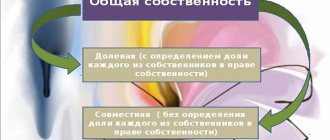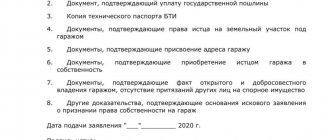1. The owner has the rights to own, use and dispose of his property.
2. The owner has the right, at his own discretion, to take any actions in relation to his property that do not contradict the law and other legal acts and do not violate the rights and interests protected by law of other persons, including alienating his property into the ownership of other persons, transferring it to them, while remaining the owner , the right to own, use and dispose of property, pledge property and encumber it in other ways, dispose of it in any other way.
3. Possession, use and disposal of land and other natural resources, to the extent that their circulation is permitted by law (Article 129), is carried out by their owner freely, if this does not cause damage to the environment and does not violate the rights and legitimate interests of other persons.
4. The owner can transfer his property into trust management to another person (trustee). The transfer of property into trust management does not entail the transfer of ownership rights to the trustee, who is obliged to manage the property in the interests of the owner or a third party specified by him.
- Article 208. Claims to which the limitation period does not apply
- Article 210. Burden of maintaining property
What is property rights
The Constitution of the Russian Federation and the Civil Code of the Russian Federation provide for the following types of property:
- state (two levels - federal and constituent entities of the Russian Federation);
- municipal;
- private property of citizens and legal entities;
- other forms (Article 8 of the Constitution of the Russian Federation, Article 212 of the Civil Code of the Russian Federation).
The legislation establishes three powers that form the right of ownership of citizens and legal entities, municipalities, the Russian Federation and constituent entities of the Russian Federation: possession, use and disposal (Article 209 of the Civil Code of the Russian Federation, Article 35 of the Constitution of the Russian Federation). In other words, the owner has the right, at his own discretion, within the framework provided by law, to determine the fate of the objects that belong to him. The Constitution of the Russian Federation proclaims the inviolability of private property rights of citizens and legal entities; deprivation of property is allowed only by a court decision (Article 35 of the Constitution of the Russian Federation), and restrictions are established by laws (Article 213 of the Civil Code of the Russian Federation).
Commentary to Art. 209 Civil Code of the Russian Federation
1. Clause 1 of the commented article provides a general description of the powers of the owner. The right of property is the most important institution in the sub-branch of property law and the system-forming core of the branch of civil law as a whole.
In a subjective sense, the right of ownership is the most complete legally secured opportunity to own, use and dispose of an individually defined thing at one’s own discretion, regardless of other persons and without a time limit. It has both generic characteristics of real rights (for the concept and characteristics of real rights, see the commentary to Article 216 of the Civil Code), as well as specific characteristics that distinguish it from other real rights.
2. The first (generic) sign of ownership is that its object is an individually defined thing. Thus, precisely because of the absence of this attribute, intellectual property, which has as its object intangible results of intellectual activity and means of individualization, can be considered only a homonym of property rights, but not its variety. Regulations ch. 13 of the Civil Code on property rights do not apply to intellectual property, either directly or subsidiaryly, which is confirmed in Art. 1227 Civil Code.
The concept of an object of ownership does not depend on the negotiability of this object. Ownership includes both objects that have not been withdrawn from circulation and are limited in circulation, as well as objects that have been withdrawn from circulation (see commentary to Article 129 of the Civil Code).
The second (generic) characteristic of property rights is its absoluteness. Satisfaction of the owner's interest depends only on his actions; the owner does not need anyone's help, anyone's mediation.
The third (generic) characteristic of property rights, like any other property right, should be the presence of the right to use, mentioned in paragraph 1 of the commented article. Use is a legally secured opportunity to extract useful properties, fruits and other income from a thing during its operation.
Violation of the intended purpose when using a thing is not illegal, unless the rights and legitimate interests of third parties, as well as the foundations of legal order and morality, are violated. Thus, the use of land plots or residential premises in violation of their intended purpose may lead to termination of ownership rights to them (see commentary to Articles 285, 293 of the Civil Code).
3. The fourth feature of property rights - the presence, along with the right to use, also the right to possess - is no longer generic, but species-forming, since it is not characteristic of all property rights. Possession is understood as the legally secured possibility of volitional, actual and direct domination of a person over a thing. Possession is characterized by the following features.
Firstly, it is expressed in direct domination over a thing, i.e. independent and open exercise of economic power over it.
Secondly, this dominance is actual, meaning the possibility of entering into physical contact with a thing every time as quickly as it depends on the will of the owner and the content of the right granted to him. Therefore, a rented piano, which according to the terms of the agreement continues to remain in the lessor's house, cannot be considered to be in the possession of the lessee.
Thirdly, such domination must be strong-willed, i.e. directly aimed at the desire to own. The presence of such a will is evidenced precisely by the use of a thing (readiness to begin such use at any moment). In this, strictly speaking, possession (possessio) as a right of ownership (clause 1 of the commented article) differs both from the spatial relationship of proximity to a thing, and from holding (detentio), which presupposes the possession of a thing, but not for the purpose of extracting useful things from it properties corresponding to its economic purpose. Dominance in holding is not an end in itself, but a forced state that allows solving the problems facing the holder (custodian, carrier, commission agent, trustee).
4. The Civil Code distinguishes between legal and illegal possession. Legal ownership is carried out on some legal basis (title; hence the second name - “title ownership”). Other possession is considered illegal or untitled.
In turn, illegal possession is divided into bona fide and dishonest. The conscientiousness of the illegal owner is manifested in cases where he did not know and could not know about the illegality of his possession. In other cases, the illegal owner is unscrupulous.
The classification of illegal possession into bona fide and bad faith has legal significance for resolving the issue of acquiring property rights by acquisitive prescription (see commentary to Article 234 of the Civil Code), as well as for calculating calculations of income and expenses between the plaintiff (owner) and the defendant (illegal owner) upon satisfaction of a vindication claim (see commentary to Article 303 of the Civil Code). The question of the good faith of the legal owner has no legal significance.
5. The fifth (species-forming) feature of the right of ownership is the presence of the authority to dispose of a thing, which is generally described in paragraph 2 of the commented article. An order is a legally secured opportunity to determine the fate of a thing (sale of a thing, putting it as collateral, transferring it to the authorized capital of a business company, combining property for joint activities, etc.). The concepts of disposal of a thing and its alienation are correlated as genus and type: not every disposal is associated with alienation. For example, transferring a thing for temporary use (lease) is its disposal, but not alienation. However, any alienation is an act of disposal of a thing.
In judicial practice, the question often arises about the validity of a contract for the sale and purchase of a thing, if at the time of its conclusion the seller was not its owner. Such an agreement should not be declared invalid on the basis of this fact alone. The seller has the right, in pursuance of the purchase and sale agreement, to purchase the item after its conclusion, and then alienate it to the buyer.
Forms of disposal of a thing also include its destruction and renunciation of ownership rights to it. For the destruction (destruction) of a thing, see the commentary. to Art. 235 Civil Code.
6. Paragraph 2 of the commented article reveals the sixth (species-forming) feature - the exercise of the owner’s powers in the most complete manner, in his own interest and at his own discretion. Possession, use and disposal of a thing constitute the triad of powers of the owner and determine the content of the right of ownership. However, the same powers are inherent, for example, in the obligatory right of trust management or the limited real right of economic management. Possession and use as powers of real rights are always conditioned by the presence of an interest in the subject of this right.
The concept of one's own discretion can be defined as a lawful activity in choosing the most optimal option for implementing the granted powers. It is indicative that, according to the Civil Code of 1964, the owner’s powers to own, use and dispose of property were exercised “within the limits established by law” (Article 92). It should be considered an achievement of the current Code to shift emphasis to the possibility of the owner exercising powers primarily at his own discretion.
7. At the same time, the right of ownership is not unlimited. A conflict between the individual interests of the owner and public order is inevitable in cases where ownership, use (and in some cases even non-use: for example, an agricultural land plot for three years - Chapter VII of the Land Code) and disposal of a thing lead to a violation of the rights and legitimate interests of third parties. The right of private property does not belong to those rights that, in accordance with Art. 56 of the Constitution are not subject to restrictions under any circumstances (Resolution of the Constitutional Court of December 17, 1996 N 20-P “In the case of verifying the constitutionality of paragraphs 2 and 3 of part one of Article 11 of the Law of the Russian Federation of June 24, 1993 “On the federal tax police authorities” "(SZ RF. 1997. N 1. Art. 197)).
The main motives for establishing restrictions on property rights today are an understanding of the limited nature of natural resources (including land), a shortage of housing, reducing the consequences of using sources of increased danger, compliance with fire, sanitary and other safety rules, the inadmissibility of violating the rights and legitimate interests of others, and eliminating competition or creating a serious threat to morality in society.
8. It follows from paragraph 2 of the commented article that restriction of property rights is possible by adopting a law or other legal act. At the same time, according to the general rule of paragraph 2 of Art. 1 of the Civil Code, restrictions on civil rights can only be introduced by federal law. Taking into account the supreme legal force of clause 3 of Art. 55 of the Constitution, the right of ownership can only be limited by federal law (see also paragraph 1 of the Supreme Arbitration Court Resolution No. 8).
True, the right of ownership may be limited by these acts in the manner prescribed by federal law. Thus, restrictions on the ownership of vehicles (for example, the List of faults and conditions under which the operation of vehicles is prohibited) are established by the Road Traffic Rules of the Russian Federation (approved by Resolution of the Council of Ministers - Government of the Russian Federation of October 23, 1993 N 1090). However, these restrictions are authorized by the Federal Law of December 10, 1995 N 196-FZ “On Road Safety” (SZ RF. 1995. N 50. Art. 4873).
At the same time, restrictions on property rights, even those established by federal laws, have limits. The right of ownership may not be limited arbitrarily, but only to the extent necessary in order to protect the foundations of the constitutional system, morality, health, rights and legitimate interests of other persons, ensuring the defense of the country and the security of the state (Articles 34, 36 , paragraph 3 of article 55, article 56 of the Constitution, paragraph 2 of article 1 of the Civil Code).
9. The right of ownership cannot be limited by an agreement between the owner and any person. The interest of the person to whom the owner must transfer the property is ensured not by restrictions on the right of ownership, but by the obligations arising for the owner (for example, the obligation not to interfere with the use of the thing in accordance with the terms of the contract). The only way to “punish” him for deviating from the agreement will be to bring him to justice provided for by the agreement or, if there are grounds, by law.
10. It is necessary to understand how the emergence of a limited property right affects the scope of property rights. In this case, the right of ownership is, as it were, compressed, since the rights of ownership and use, by definition, are transferred to the subject of limited property rights. The right of ownership itself becomes, in fact, a limited property right until the transferred property rights return to the owner. If the power of disposal also passes to the subject of a limited real right, then the right of ownership generally acquires the character of a so-called bare right (ius nudus). At the same time, the owner of a thing, by definition, cannot be the subject of a limited property right to it.
10. The seventh (species-forming) feature of property rights is that it is perpetual, since it is not limited by law or contract to any period.
11. In the literature one can find different approaches to determining property rights, the main ones of which are the following two, opposite to each other.
Thus, in the definition of property rights, some authors propose to include a larger number of powers than is provided for by the traditional triad of possession, use and disposal in our legislation. However, upon a more detailed analysis, it turns out that the other listed “superpowers” of the owner are only shades of the three traditional powers and fit well into the definition of property rights given above.
Sometimes, on the contrary, it is pointed out that it is useless and even harmful to include the triad of powers in the definition of property rights, since it contradicts the completeness of this right. However, there is no contradiction in this case. Firstly, the triad is formulated so successfully that it includes any possible options for the owner’s actions, and at the required level of abstraction. Secondly, the definition of property rights in the commented article includes not only a triad, but also an indication of one’s own discretion.
12. Clause 3 of the commented article contains in general terms the legal regulation of property relations in land and other natural resources. When applying this paragraph, the provisions of special legislation should be taken into account: Ch. 17 of the Civil Code, LK, ZK, Water Code, Law on the Turnover of Agricultural Land, Law on Environmental Protection, Law on Environmental Expertise, etc. (see also commentary to Article 129 of the Civil Code).
13. As mentioned above, self-interest does not occur in rights of obligation. Thus, the trustee, in accordance with paragraph 1 of Art. 1012 of the Civil Code exercises these powers purely in the interests of the owner or a third party (beneficiary) indicated by him. To emphasize the difference between ownership and trust management, the legislator specifically indicated in paragraph 4 of the commented article that the transfer of property into trust management does not entail the transfer of ownership to the trustee.
What legal acts regulate property issues of citizens and legal entities
It is impossible to answer in monosyllables the question of what law determines the rights of citizens to property, since the main regulation is contained in civil legislation, general provisions are provided for in the Civil Code of the Russian Federation (Section II). Certain types and regimes of property, accounting and registration rules are also regulated by special legal acts, for example:
- land plots - by the Land Code of the Russian Federation;
- water bodies - by the Water Code of the Russian Federation;
- property relations of spouses by the Family Code of the Russian Federation.
Very often, references to special regulatory legal acts are contained in the general rules of the Civil Code of the Russian Federation, as an example - the norms of the Civil Code of the Russian Federation on the mandatory state registration of rights to real estate, restrictions (encumbrances) in relation to them. Regulation of this issue relates to the Federal Law “On State Registration of Real Estate” No. 218-FZ dated July 13, 2015.
When does shared property between spouses arise?
As we have already noted, various questions regarding the disposal of OS often arise among married spouses. It should be noted that shared ownership of property (for example, an apartment owned by a husband and wife together) can arise when the contractual regime is applied. If the legal regime established by family law is used in relation to property, joint property arises. In order for an object of property to belong to spouses on the right of shared ownership (the difference is very important), it is necessary:
- conclude a marriage contract;
- conclude a separate agreement for the acquisition or creation of property assets.
If joint property is converted into shared property by concluding a marriage contract, then the contractual regime will apply to all property belonging to the spouses (and mentioned in the terms of the document). The conclusion of a separate contract for an object provides for the extension of the contractual regime to a certain property. In controversial situations, shared ownership of property can be established through the court.
Important! One part of the spouses’ property may be in shared ownership, and the other in joint ownership. Accordingly, for different objects of property it is possible to apply different regimes - both legal and contractual.








